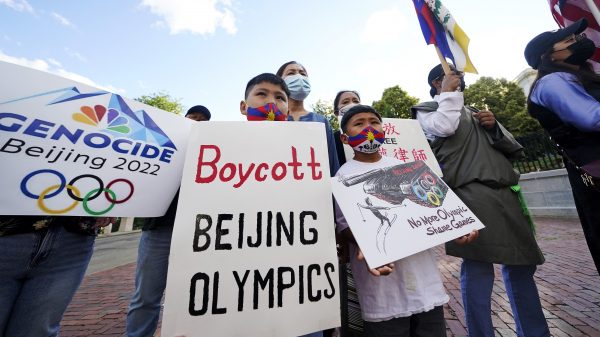Lisbeth Rhonna Herr, Politics, Second Year
A handful of Western countries including the US, Australia and the UK have recently declared a diplomatic boycott of the 2022 Beijing Winter Olympics in protest against China’s alleged human rights violations.
Although well intentioned, politicians need to look further than sporting events in order to pile the pressure on China.
China has been accused by Western governments and human rights activists of committing mass human rights violations and genocide against Muslim ethnic minorities in Xinjiang.

Military aggression against the self-ruled island of Taiwan, the repression of Tibet as well as the suppression of democratic movements in Hong Kong are also major human rights issues of concern. China continues however to deny the accusations and is prepared to host the upcoming Winter Games this February.
The diplomatic boycott means that these countries’ top government officials - but not the athletes – will not attend the Winter Games. The move is intended to demonstrate these countries’ disagreement, and to denounce, China’s inhumane policies without penalising athletes.
The decision partly responds to the demands of human rights activist groups and the #NoBeijing2022 campaign which demands a full boycott of the so-called 'Genocide Games'.
These winter games in Beijing will become known as the Genocide Olympics. What’s taking place in Western China is nothing short of genocide. #BoycottBeijingOlympics
— Mike Pompeo (@mikepompeo) January 8, 2022
pic.twitter.com/43gNfWsbsL
But in the context of forced sterilisation, genocide and mass imprisonment, is a boycott really enough to force the monolithic Chinese state to change its ways? The answer is no, for two reasons.
Firstly, Olympic boycotts don't always work.
The most significant Olympic Games boycott was of the Moscow Games by over 60 countries in the 1980s. The move was a response to Russia’s invasion of Afghanistan.
The boycott however did not prove effective as Soviet foreign policy remained unchanged and troops only left Afghanistan in 1989. Athletes were also ultimately punished by the boycott.
#BREAKING China says four Olympic diplomatic boycott nations will 'pay the price' pic.twitter.com/Vm9WU6hbEG
— AFP News Agency (@AFP) December 9, 2021
This unconvincing precedent means that the boycott will likely have a limited diplomatic impact.
Secondly, some experts argue that the boycott could make it more difficult to gain concessions from China.
The boycotts will embarrass China, who will retaliate by refusing diplomatic relations with the West. The hosts have already declared that boycotting countries will 'Pay the price' for their actions. This could block off any chance the West has of negotiating peacefully towards the reduction of these human rights abuses.
US announces diplomatic boycott of China's 2022 Winter Olympics in Beijing https://t.co/bEgpgArCD1
— BBC Breaking News (@BBCBreaking) December 6, 2021
So what else can governments do to intervene in these human rights contraventions?
Going forward, countries should be assessed on their human rights record by an independent panel prior to submitting their candidacy to host the Olympic Games or other global sporting events (such as the World Cup).
This would send a message that the global community upholds human rights values and the spirit of the Games. A diplomatic boycott is significant insofar as it shows disapproval of the host countries’ government, however it is not enough by itself.
Ultimately, this boycott will attract the ire of China for little noticeable benefit. Governments and international institutions must supplement this act with a barrage of diplomatic, financial and political sanctions if the international community has any chance of convincing China to change its ways.
Featured image: Unsplash/Todd Trapani
Have an opinion on the diplomatic boycott? Let us know @EpigramOpinion !









